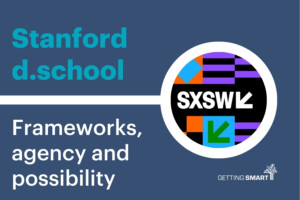What Relationships Drive Learning? Try Fathers

Patrick Riccards
Last year, I heard of a school that was so excited to have a father come in and volunteer that it decided to throw a huge party, in honor of the father. The thought that dads volunteering in the schools was so unique that they should be celebrated, regaled, and placed on a pedestal for taking time from their busy lives.
As mothers across the country grapple with the notion of “leaning in,” and are told that they need to be more like men—sacrificing family and personal needs for work—if they want to be truly professional, perhaps we need to look to the opposite. Maybe, just maybe, we should be talking about how dads should be more involved in their children’s learning. How men need to look beyond the annual back-to-school nights or checking on homework in the evenings, and actually roll up their sleeves and be active, positive, regular presences in the learning experience.
Don’t get me wrong, I’m not saying there aren’t engaged fathers. We all know dads that are highly involved in their local schools and in their kids’ learning. But we should be looking at that as the norm, rather than the exception. We should come to expect it of all fathers, rather than make is seem so damned special.
When my children first started school, I was a “work-first” type of father. I justified that my primary duty was to earn a living and ensure my kids were never wanting. A good home. A full fridge. A closet of clothes. Even their own iPads. While my family was the focus of my life, how I attended to them was to work harder and longer. I was the provider.
Unfortunately, that tablet is an inadequate substitute for an involved parent. By spending more time in my kids’ school, I saw the potential impact my presence could have, both on their learning and on their social development. I knew that my time was far more valuable than the latest electronic.
Of course, that is not saying that dads should quit their jobs and commit their lives to their children’s educations. Nor is it saying that a father can’t be active in the learning experience AND professionally successful. It means that fathers need to work at it. We need to fight each day to find that balance. We need to look at how we can constantly improve to help our kids develop into the inquisitive, interesting, successful people that we all hope them to become.
With my son, it means using tablets as both a learning platform and a reward. In class, I noticed that he would hold a traditional book like it was a ticking bomb. Or he would look for ways to avoid needing to read, in part because he is a struggling reader. But get him home, give him a tablet, and watch him go. An unlimited library available to him, and programs that will read along with him. We are now leveraging his love for Minecraft to develop him math skills. And it is absolutely incredible what he designs with Minecraft. And it has extended to reading, as we discovered a Kindle novel collection set in the Minecraft world, books that my struggling reader just can’t get enough of.
My children have grown up watching technology drive my life. As toddlers, they knew if my cell phone rang or my smartphone indicated an incoming message, they were to bring it to me immediately. They were able to model my behavior, knowing how to hold a device and what motions to make to have it perform as intended.
But the real power of the technology comes from understanding what is happening in class, from seeing my kids’ strengths and knowing how to supplement what is happening. It comes from seeing where they struggle and embracing where they soar. Such determinations can’t be made from a report card or an email from the teacher or a quick review of the evening’s homework. They require hands-on knowledge that comes from being in the classroom, watching the learning process.
In talks about achievement gaps and struggling schools, the family dynamic is usually the second item discussed, after poverty and finances. We know that fathers play an important role in their kids’ lives. We cite the father dynamic regularly, whether it be grad rates or crime rates.
So why do we pay so little attention to the role of the father in the learning experience? If the presence of a father in a child’s life has such impact, think about what a dad active in the schools and involved in the learning process can do.
Last year, there was a study in Psychological Science that found that daughters aspire to greater professional goals when they see their fathers doing tasks such as washing the dishes. Consider that for a moment. A young girl has a better chance of become a CEO or governor of even president if she sees her dad at the sink, scrubbing away at the remnants of dinner.
If that’s true, imagine the possibilities for all of those girls (and boys) who see their dads volunteering in school or visiting the classroom, right alongside all of the moms they come to expect. Imagine how much more interesting that science project looks when dad is in the class to help. Or how intriguing the field trip can be with dad leading a group. Or how that device can be transformed from a Netflix machine to a learning device that opens up new worlds and unlimited possibilities.
This blog is part of our Smart Parents Series in partnership with the Nellie Mae Education Foundation. We would love to have your voice in the Smart Parents conversations. For more information about the project see Parents, Tell Your Story: How You Empower Student Learning as well as other blogs:
- Growth Mindset Parenting
- Is Your Child’s School Student-Centered? A Checklist for School Visits
- Ready for the World: Success in the Age of Change

Patrick Riccards is the founder of the Eduflack blog, which examines the intersection if education policy, research, and communications. Follow him on Twitter with @dadprovement.







0 Comments
Leave a Comment
Your email address will not be published. All fields are required.